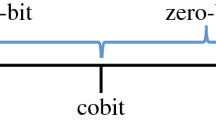Abstract
Vector-Quantization (VQ) is an effective and widely implemented method for low-bit-rate communication of speech and image signals. A common assumption in the design of VQ-based communication systems is that the compressed digital information is transmitted through a perfect channel. Under this assumption, quantization distortion is the only factor in output signal fidelity. Moreover, the assignment of channel symbols to the VQ Reconstruction Vectors is of no importance. However, under physical channels, errors may be present, degrading overall system performance. In this case, the effect of channel errors on the VQ system performance depends on the index assignment of the Reconstruction Vectors. For a VQ with N Reconstruction Vectors there are N! possible assignments. Hence, even for relatively small values of N, an exhaustive search over all possible assignments is practically impossible. In this paper, upper and lower bounds on the performance of VQ systems under channel errors over all possible assignments are presented using Linear Programming arguments. These bounds may give the system designer more insight about the gain that could be achieved by improving the index assignment. In numerical examples, the bounds are compared with the performance obtained by using a set of random assignments, as well as with an index assignment obtained by the well-known index switching algorithm.
Access this chapter
Tax calculation will be finalised at checkout
Purchases are for personal use only
Preview
Unable to display preview. Download preview PDF.
Similar content being viewed by others
References
Gersho A. and Gray R.M., Vector Quantization and Signal Compression, Kluwer Academic Publishers, Boston 1991
Ben-David G. and Malah D., “Properties of the Natural Binary Code Assignment for Uniform Scalar Quantizers under Channel Errors”, Proc. of the ECCTD-93, Elsevier Amsterdam, pp. 773–778, 1993.
Ben-David G., Vector and Scalar Quantization under Channel Errors, D.Sc. Thesis,Technion - I.I.T. Haifa, 1995
Ben-David G. and Malah D., “Simple Adaptation of Vector-Quantizers to Combat Channel-Errors”, Proc. of the 6th IEEE DSP Workshop Oct. 1994, IEEE NY, pp. 41–44, 1994.
McLaughlin SW, NeuhoffDL, Ashley J., “The optimality of the Natural Binary Code”, Proc. of the Joint DIMACS/IEEE Workshop on Coding and Quantization, Oct. 1992.
Crimmins T.R., Horwitz H.M, Palermo C.J and Palermo R.V., “Minimization of Mean-Square Error for Data Transmitted Via Group Codes”, IEEE Trans. Inform. Theory, vol. 15, no. 1, pp. 72 – 78, Jan. 1969.
Farvardin N. “A study of Vector Quantization for Noisy Channels”, IEEE Trans. Inform. Theory, Vol. 36, No. 4, pp. 799 – 809, Jul. 1990.
Gersho A. and Zeger K.A., “Zero Redundancy Channel-Coding in Vector Quantization”, Electronics Letters. Vol. 4, pp. 654 – 656, June 1987.
Gersho A. and Zeger K.A., “Pseudo-Gray Coding”, IEEE Trans. Comm., Vol. 38, No., pp. 2147–2158, 12 Dec. 1990.
DE Marca J.R.B., and Janyant N.S. “An algorithm for Assigning Binary Indices to the Codevectors of a multi-Dimensional Quantizer”, Proc. of IEEE Int. Conf. Comm., Seatte WA, pp. 1128–1132, June 1987.
Knagenhjelm P., “A recursive Design Method for Robust Vector Quantization”, Proc. Int. Conf. on Signal Processing Applications and Technology, Boston-92, pp. 948–954, Nov. 1992.
Knagenhjelm P., “How good is your assignment?”, Proc. IEEE ICASSP 93, Minneapolis, Minnesota, pp. 423–426, Apr. 1993.
Gilmore P.C., “Optimal and Suboptimal Algorithms for the Quadratic Assignment Problem”, J. Soc. Indust. Appi. Math, Vol. 10, No. 2, pp. 305 – 313, June 1962.
Lancaster P. and Tismenetsky M., The Theory of Matrices, Academic-Press, Orlando,1985.
Taha H. A, Operations Research, Maxwell-MacMillan NY, 1987.
Taub H. and Schilling D.L., Principles of Communication Systems, McGraw-Hill, New-York, 1986.
Jayant N.S. and Noll P., Digital Coding of Waveforms, Prentice-Hall 1984.
Author information
Authors and Affiliations
Editor information
Editors and Affiliations
Rights and permissions
Copyright information
© 1996 Springer-Verlag London Limited
About this paper
Cite this paper
Ben-David, G., Malah, D. (1996). Bounds on the Performance of Vector-Quantizers operating under Channel Errors over all Index Assignments. In: Biglieri, E., Luise, M. (eds) Signal Processing in Telecommunications. Information Technology: Transmission, Processing and Storage. Springer, London. https://doi.org/10.1007/978-1-4471-1013-2_8
Download citation
DOI: https://doi.org/10.1007/978-1-4471-1013-2_8
Publisher Name: Springer, London
Print ISBN: 978-3-540-76019-1
Online ISBN: 978-1-4471-1013-2
eBook Packages: Springer Book Archive




